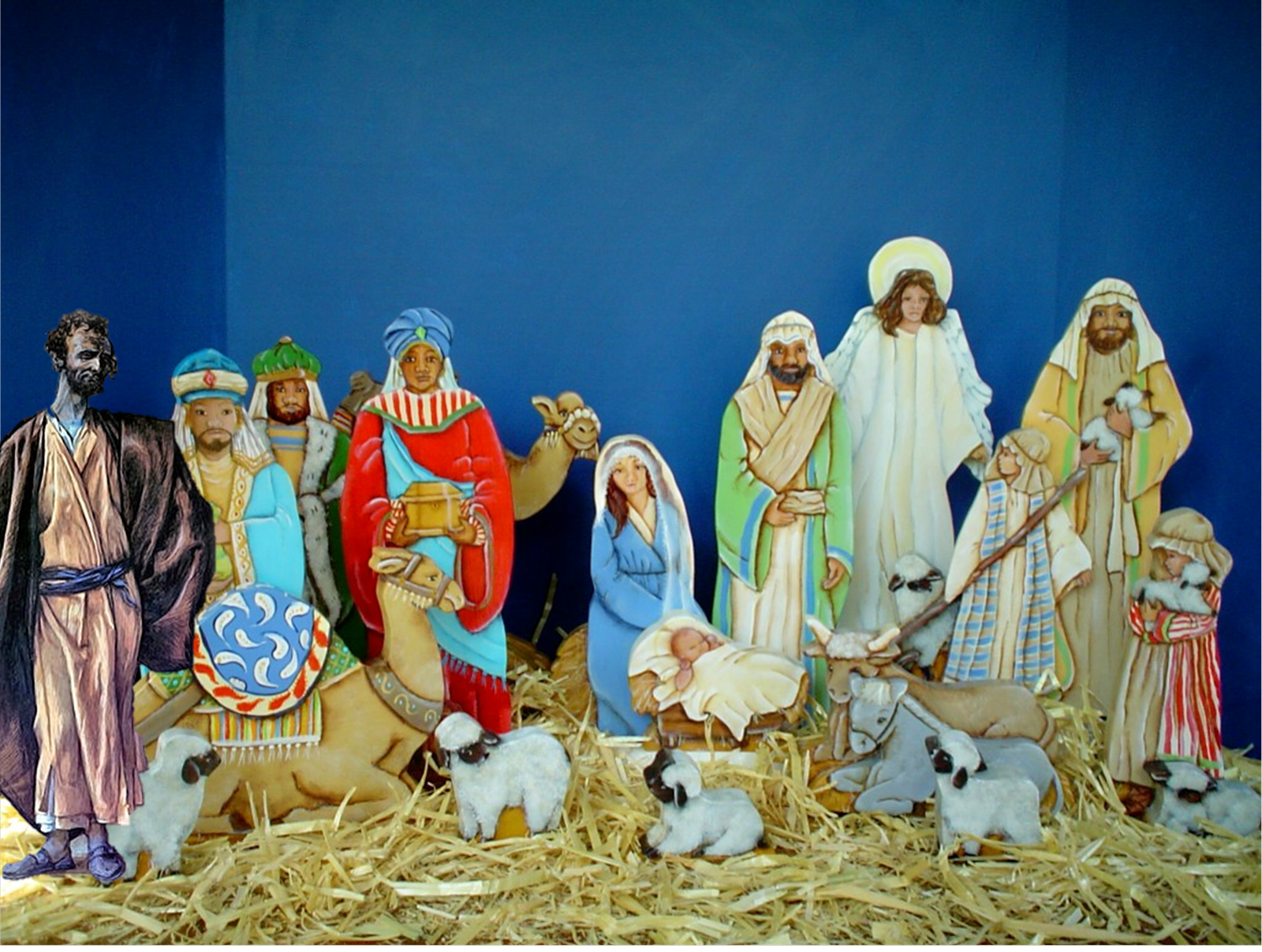I do not usually post my sermons in my blog like this, but I was honestly fascinated by what I discovered in my research around the story of the Magi this year. Did you know that there was another story about the journey of another set of Magi that Matthew might have had in his mind as he wrote his story about the birth of the Messiah?
In May of 2003, the world was treated to a spectacle that it would not soon forget. The Iraq War had begun with an invasion less than two months before. And in those two months the American and allied forces had made some remarkable progress, had taken Baghdad and were apparently in charge of the government.
And so that May, President Bush took a bit of a victory lap. He landed on the deck of an aircraft carrier that had just returned from the Persian Gulf wearing a flight suit and, standing in front of a banner that read mission accomplished,” he declared that major conflict in Iraq had come to an end.

It is an event that I hardly need to describe to you. I’d probably only have to say a few key words like
Bush and
aircraft carrier for you to bring the whole image up in your minds even though it happened over a decade ago. Everyone remembers it. And they don’t just remember it because it had all the pageantry of your typical political photo op and publicity stunt, though it certainly had that. People remember it because that particular photo op was demonstrated to be horribly empty and meaningless and because that happened so very quickly.
It wasn’t long at all before everyone could clearly see that combat in Iraq was far from over, that the mission was certainly not accomplished and that things were about get a whole lot worse before they got any better – if indeed they ever got much better. People remember it because it turned out to be a perfect illustration of what was wrong with the whole situation.
Now, I don’t bring all this up today to criticize Bush or the Iraq war. I have no particular axe to grind there. I bring it up just to show you how an event like that one, one that symbolizes the problems within a system, stays in the public consciousness for a long time. Why I would imagine that, even ten or twenty years from now when someone brings up that event, people will still remember it and even be able to picture it even if they didn't see it when it happened.
I mention that because the Gospel of Matthew was written only about twenty years after a very similar mission accomplished event. It happened in 66 ad. It happened in Rome but was based on the conclusion – or what was supposed to be the conclusion – of a war with Iraq and Iran or, as it was known at the time, the Kingdom of Parthia.
The war is not important and you hardly need to understand what it was about. Basically, for years the Roman Empire and the Parthians had been fighting over a little kingdom – the Kingdom of Armenia – that lay between them. The Romans had controlled Armenia by choosing the kings who ruled it for years. But the Parthians didn’t like that and so Armenia became the focus of war between the world’s two greatest superpowers. And let’s just say that in the years leading up to 66 ad, the Romans basically bungled the war with Parthia. The result was that Rome and Parthia came to a peace agreement that was absolutely humiliating to Rome.
The agreement was this: the Parthian king would place his brother on the throne of Armenia and the Parthians would retain the right to name all future kings and heirs to the throne of Armenia. In the deal the Romans only got one thing. They got the right to crown the king that the Parthians chose. Yes, you heard that right, the Parthians would pick the king and then the Roman Emperor would be required to crown him. The Parthians got everything and the Romans got an empty, meaningless symbolic act.
But in 66 ad the Roman Emperor, a fellow named Nero (maybe you’ve heard of him), decided to turn this embarrassing peace treaty into his own personal mission accomplishedphoto op. He summoned the new Armenian king (the brother of the King of Parthia) to Rome to receive his crown. Sure it was absolutely meaningless that Nero got to be the one to place it on his head but Nero would turn this meaningless act into a grand spectacle.
And what a spectacle it was! People all throughout Rome and every city they passed through on the way turned out to see the embassy as they made their way to the Emperor. Travelling with the king were a number of priests of the Parthian god Zoroaster. They were astrologers and holy men and they were called magi by the Parthians. If anything, the Romans were more fascinated by the magi than they were with the king. The magi were mysterious wise men who seemed to have so much power and Rome was totally star-struck.
The king and the magi arrived before Emperor Nero. They knelt down and paid him homage, declaring him to be the ruler of all the earth, though everyone knew it was a lie and Nero had no power over Parthia. Then Nero placed a diadem on the king’s head and then threw an enormous party for the whole city. After the magi left – returning home by a different road – Nero even took the extraordinary step of closing the doors to the temple of Janus in the city. The Romans only closed those doors when they were at peace with all their enemies. By closing the doors, Nero was proclaiming that he had brought about a permanent peace on earth and good will to all men.
It was all a sham, of course. Within a few months the doors to the temple of Janus were wide open again and Rome was at war. The war with Parthia raged on for about another fifty years and caused no end of suffering. Nero had accomplished nothing with his little stunt and it wasn’t long before everybody knew it. So, yes, the story of the visit of the magi to Rome was told over and over again as the perfect criticism of Roman emperors at their worst. After a decade or two, I’m sure that all you had to do was mention a few key words like magi or king or kneeling down and paying homage or returning home by a different road and everyone knew exactly what you were talking about.
And a decade or two after this memorable spectacle in Rome, a man that we know as Matthew wrote the gospel that bears his name. Do you think it is just a coincidence that, after a few opening remarks, he started that gospel with an account of some magi who travelled from Parthia (because that is where magi were found) to kneel down and pay homage to someone and then return home by a different road?
Now, I have no idea how much information Matthew may have had about an actual visit of magi to the home of Mary and Joseph in Bethlehem. I am sure that he did use traditions of the early church as well as many passages from the Old Testament when he wrote this account of the birth of Jesus. But I am also pretty sure that, when he told his story of the visit of the magi (translated as wise men in our reading this morning) he went out of his way to tell the story in a way that reminded many people of the famous story of the time that a bunch of magi came to Rome
But why would Matthew do something like that – make a reference to what we would consider a purely political and secular event in his account of the most divine of events: the coming of God’s Messiah into the world? Well, the fact of the matter is that the visit of the magi to Nero wasn’t just a political event. Remember that Emperor Nero was not just a political leader. He was also a god and the whole spectacle of the magi (the priests of a foreign god) bowing down before him had as much to do him flaunting his divinity as it did with him exercising his imperial power.
I think that Matthew would have been only too happy to remind his readers of Nero’s mission accomplished event because it may have looked pretty impressive on the outside, but it was soon shown to be completely empty. And Matthew knew of another king – one that maybe didn’t look so impressive on the outside – one who was, in fact, rejected by the powerful and the important of this world. But when it came to substance and power that really mattered and when it came to a vision of the world as God had always intended that it should be, Matthew would take that king anytime.
So Matthew told the story of the visit of the magi to the child Jesus in such a way as to make it clear how different a king Jesus really was – to make it clear that Jesus was not about appearance and photo ops but about changing the world in real and substantial ways.
And I think that all of this is important because we live in a world where appearance often seems to matter more than anything. It’s important because 2015 will be an election year in Canada. And elections really ought to be an opportunity to talk about big and substantive issues. We ought to get a chance to talk about what kind of country we want to be, what our real priorities are and what policies reflect our deepest beliefs. But do you suppose that is what our political discussions will look like in 2015? Or will we spend a whole lot of time talking about appearances? And will our leaders put most of their energy into setting up symbolic photo ops?
Please understand, I’m not necessarily blaming the politicians for this. I am sure that many of them would really like to spend their energy on the real and substantive issues. The problem is much bigger than individual politicians. There is a tendency in our society to focus on the surface and the appearance of things and politicians are only responding to that when they set up their photo ops and attack each other over the appearance of things.
But when you see a politician speaking to the public with carefully laid out representatives of different ethnic and cultural groups standing behind him or her, when you hear announcements that are all about the appearance of commitment to some particular cause but that have no real effective measures behind them, when you hear of committees or commissions that are set up to explore various problems whose recommendations you know very well will be completely ignored – and I promise you that you will see a whole lot of all of that next year – remember one thing.
Remember that there is another way of doing things. There is a kingdom that is founded on the idea that we can do more for this world than put together photo ops and carry out meaningless symbolic gestures. The kingdom of God is not founded on such things but rather on the foundation of a person who showed us in living and breathing form what the love and compassion of God looked like.
We don’t have to be taken in and manipulated by meaningless gestures orchestrated by our political class. We know they’re empty long before the rest of the world catches on.
It is far too easy to get cynical when you look at the systems of our modern world – to think that nothing can ever change. By telling his story of the magi, what Matthew was saying was that the world did change and so it can change. It was that simple to him. Will you believe it?
For those interested in the primary historical sources, accounts of the visit of the Armenian king to Nero are found in Suetonius, The Lives of the Twelve Caesars, Nero, 13 and in Cassius Dio, Roman History, LXIII, 1-7. The explicit mention that the king brought Magi with him and that they captured the imaginations of Nero and the people is found in Pliny the Elder, The Natural History, XXX, Cassius Dio states that the day was called "golden" by the people of Rome.




.jpg)

